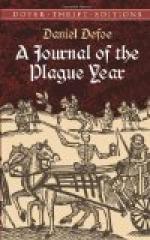Many houses were then left desolate, all the people being carried away dead; and especially in an alley farther on the same side beyond the bars, going in at the sign of Moses and Aaron.[245] There were several houses together, which they said had not one person left alive in them; and some that died last in several of those houses were left a little too long before they were fetched out to be buried, the reason of which was not, as some have written very untruly, that the living were not sufficient to bury the dead, but that the mortality was so great in the yard or alley that there was nobody left to give notice to the buriers or sextons that there were any dead bodies there to be buried. It was said, how true I know not, that some of those bodies were so corrupted and so rotten, that it was with difficulty they were carried; and, as the carts could not come any nearer than to the alley gate in the High Street, it was so much the more difficult to bring them along. But I am not certain how many bodies were then left: I am sure that ordinarily it was not so.
As I have mentioned how the people were brought into a condition to despair of life, and abandoned themselves, so this very thing had a strange effect among us for three or four weeks; that is, it made them bold and venturous. They were no more shy of one another, or restrained within doors, but went anywhere and everywhere, and began to converse. One would say to another, “I do not ask you how you are, or say how I am. It is certain we shall all go: so ’tis no matter who is sick or who is sound.” And so they ran desperately into any place or company.
As it brought the people into public company, so it was surprising how it brought them to crowd into the churches. They inquired no more into who[246] they sat near to or far from, what offensive smells they met with, or what condition the people seemed to be in; but, looking upon themselves all as so many dead corpses, they came to the churches without the least caution, and crowded together as if their lives were of no consequence compared to the work which they came about there. Indeed, the zeal which they showed in coming, and the earnestness and affection they showed in their attention to what they heard, made it manifest what a value people would all put upon the worship of God if they thought every day they attended at the church that it would be their last. Nor was it without other strange effects, for it took away all manner of prejudice at, or scruple about, the person whom they found in the pulpit when they came to the churches. It cannot be doubted but that many of the ministers of the parish churches were cut off among others in so common and dreadful a calamity; and others had not courage enough to stand it, but removed into the country as they found means for escape. As then some parish churches were quite vacant and forsaken, the people made no scruple of desiring such dissenters as had been a few years before deprived of their livings, by virtue of an act of Parliament called the “Act of Uniformity,"[247] to preach in the churches, nor did the church ministers in that case make any difficulty in accepting their assistance; so that many of those whom they called silent ministers had their mouths opened on this occasion, and preached publicly to the people.




